If you run an ethically-minded business, it makes sense to bank with a provider that aligns with your values.
But when it comes to business banking, the UK’s ‘Big Five’ banks (Barclays, Lloyds Banking Group, Santander, HSBC, and NatWest) still dominate – holding around 85 per cent of all small and medium-sized business accounts.
Unfortunately, these banks are also among the biggest backers of industries linked to environmental and social harm, including fossil fuels, tobacco, oil, and arms production. According to the campaign group Make My Money Matter, led by Love Actually director Richard Curtis, the Big Five banks have collectively provided over $37 billion (£29.7 billion) to fossil fuel companies in the past year alone.
In contrast, ethical banks have greener investment and lending policies and pay their fair share of tax.
While ethical business banking options are still less common than personal ethical accounts, they do exist in the UK – and switching isn’t as hard as you might think. If you run a small or medium-sized business with fewer than 50 employees and a turnover under £6.5 million, the Current Account Switch Service can handle the move for you, making it easy to switch to a bank that better reflects your values.

The providers below rank highly on the ethical stakes. All are covered under Financial Services Compensation Scheme (FSCS), meaning your assets are protected up to £85,000.
If you’re a socially-minded business, Unity Trust Bank – a Good With Money ‘Good Egg’ firm’ – is likely to be a great fit.
Unity’s mission is clear: it prioritises social good by using the deposits from your business to fund lending that supports the communities you and it serve together. By banking with Unity – the UK’s leading bank for trade unions – you help drive meaningful economic, community, and social change.
In 2023, Unity committed over £260 million in funding to 162 organisations across the UK aligned with the United Nations Sustainable Development Goals (SDGs). Notably, almost 45 per cent of this lending went to organisations delivering services in some of the UK’s most deprived areas, an increase of £21.9 million from 2022.
Unity offers a range of current and savings accounts, day-to-day banking services, and loans to organisations that share its values. You get fast, secure, and easy-to-use online banking, with the option to set up single, dual, or triple authority over payments, giving you flexibility and control.
One limitation is that Unity’s business current accounts don’t come with a debit card. However, you can pay in or withdraw cash at your local NatWest (in England and Wales) or RBS branch (in Scotland). For card-based spending, Unity has partnered with Lloyds Bank (one of the Big Five, and not known for strong sustainability credentials) to offer the Unity Corporate MultiPay Card — a charge card, subject to credit approval.
Unity currently offers three business current accounts, tailored by annual turnover. There’s a monthly fee starting at £6 (charged quarterly), and the minimum opening deposit is £500. You can check the full list of fees here.
Unity Trust Bank: 40 years of banking for impact
The Co-operative Bank’s ethical reputation suffered a hit back in 2017 when it was bailed out by a US hedge fund. But in May 2024, it took a major step back toward its roots when it was acquired by Coventry Building Society (a B Corp company) for £780 million.
The merger is likely to take several years and in the meantime, the Co-operative Bank will continue to operate under its existing name and brand. Eventually, Co-operative Bank customers will become Coventry members, reflecting a return to mutual ownership (where the bank is owned by its customers rather than outside shareholders).
Despite its recent history of ownership changes, the Co-operative Bank has maintained its customer-led ethical policy. It refuses to provide banking services to organisations that conflict with its ethical stance across a range of issues including human rights, environmental sustainability, international development, animal welfare, irresponsible gambling, and payday lending.
The bank says: “We’re committed to not providing banking services to businesses and organisations that conflict with our Ethical Policy. We’ve previously stopped an organisation from joining The Co-operative Bank on the grounds of their involvement with fossil fuel extraction, and declined services to businesses that conflict with our stance on human rights and animal welfare.”
You can read its latest sustainability report here.
The Co-op also operates a small (but gradually shrinking) physical branch network and maintains a co-operative union of customers. It offers several business current account options tailored to the needs of different small businesses – including specialist accounts for Federation of Small Businesses (FSB) members, as well as accounts for charities, co-operatives, and credit unions.
Cumberland Building Society, headquartered in Cumbria, offers business current accounts specifically to customers based in Cumbria, South West Scotland, West Northumberland, and North Lancashire. It provides two main business account options, depending on the type of business you run and the value of your daily transactions. Its business banking calculator will help you work out which one is best for you.
The Cumberland business account comes with a range of useful features. Customers receive a debit card, can set up standing orders and direct debits, and benefit from free daily cash withdrawals up to £300 per day (or £500 if withdrawing at a Cumberland branch). Online banking is included, and businesses can access an arranged overdraft facility, which carries a variable EAR of 12.73 per cent per year. For businesses using accounting software, Cumberland integrates with Xero, one of the UK’s leading online accounting platforms, and offers an e-savings account for its online banking customers.
Because Cumberland is a building society, it does not invest its members’ money in stocks or shares, meaning many of the ethical issues often associated with traditional banks do not apply. Cumberland donates 1.5 per cent of its profits to charity, powers its offices entirely with renewable energy, and has set a target to become a carbon neutral business by 2030.
Cumberland’s business accounts come with a monthly fee, which ranges from free to £3-£5 per month depending on the account selected, along with other standard charges. As an added incentive, the building society is currently offering 12 months of free banking to businesses with an annual turnover of up to £250,000, subject to terms and conditions.
Top 7 ethical current accounts
App-based bank Starling offers a business account and a sole trader account. It expressly avoids investing in fossil fuels, mining, arms, or military industries. Instead, the bank channels funds into government securities and other high-quality liquid assets. As a fully digital, paperless, branchless bank, Starling also operates with a significantly lower carbon footprint than many of its traditional banking competitors.
The basic Starling business current account comes with no monthly fees or UK payment charges, offers 24/7 customer support, and integrates with accounting software platforms like Xero, QuickBooks, and FreeAgent. Businesses can then customise their accounts by adding optional paid features – such as the Business Toolkit, which helps streamline bookkeeping, or linked multi-currency business accounts.
However, it’s worth noting that despite Starling’s firm opposition to fossil fuel investments, in March 2021 the bank accepted funding from Qatar’s sovereign wealth fund (QIA). The fund, established in 2005, was built on Qatar’s substantial oil and natural gas revenues. A spokesperson for Starling clarified that one of QIA’s main goals is to reduce Qatar’s dependence on oil and gas by expanding investment into non-hydrocarbon sectors, which is why it has backed a range of British brands, including Starling.
Read our full review of Starling Bank
While not a bank itself, Tide provides business current accounts through its partnership with ClearBank.
Tide offers a range of account plans tailored to different business needs:
Free Plan: Ideal for freelancers and startups, this plan has no monthly fee. However, transfers to and from other bank accounts cost 20p each, and expense cards are available for £5 per month.
Smart Plan: At £12.49+VAT per month, this plan includes 25 free transfers monthly, one free expense card, priority support, and access to a 24/7 legal helpline.
Pro Plan: At £24.99+VAT per month, it offers unlimited free transfers, two free expense cards, and enhanced accounting tools.
Max Plan: For £69.99+VAT per month, businesses receive three free expense cards, unlimited transfers, 0.5 per cent cashback on card purchases, and a dedicated account manager.
All plans come with features like automatic transaction categorisation, receipt uploads, invoicing capabilities, and integrations with accounting software such as Xero, QuickBooks, and Sage.
Funds in Tide accounts are held in ring-fenced accounts and are not used for investments in industries like fossil fuels, arms, or tobacco. Tide also offers a business instant savings account with competitive interest rate of 4.22 per cent AER variable.
Top 9 ethical savings accounts



Reliance Bank, part of The Salvation Army, has a clear mission to “serve customers and communities with compassion and integrity.” It is a bank deeply rooted in social responsibility, prioritising business lending to organisations that create positive social impact across the UK.
Its charity and business current account is designed to be straightforward and practical for managing everyday banking needs. It comes with a Corporate Visa debit card and a chequebook. Customers receive a paying-in book to deposit cash or cheques at any NatWest or RBS branch, and full access to internet banking for viewing statements and making payments online.
The current account carries a monthly fee of £5, with additional charges on transactions such as cash or cheque deposits, debit card payments, and cash withdrawals. Reliance also offers instant access and notice business savings accounts.
App-based Monzo positions itself as a socially responsible bank, committed to ethical investment and transparency. It states that customer deposits are invested “safely and ethically,” avoiding artificial tax planning and maintaining a strict “zero tolerance” policy on modern slavery and human trafficking.
Monzo says the majority of customer funds are kept at central banks or invested in high-quality government and quasi-government bonds, such as those issued by development banks. Monzo does not invest in fossil fuel companies, arms manufacturers, or tobacco firms.
As a fully digital, branchless bank, it has a relatively low carbon footprint and has committed to achieving net zero carbon emissions by 2030.
Monzo offers two main business account options. The Lite account, which has no monthly fee, covers essential features like business debit card payments, free UK bank transfers, and “pots” to help you organise your funds. For £9 per month, the Pro account adds tax pots, integrated accounting tools, multi-user access for limited companies, and access to exclusive offers. There is also a Team account for £25 per month, which includes expense cards for employees.
Additionally, Monzo provides a Business Instant Access Savings account, currently offering an interest rate of 1.50 per cent AER/gross.
It’s worth noting that while Monzo itself maintains ethical investment standards, some of its third-party partners do not. For example, Monzo’s savings accounts are provided through external banks like Shawbrook Bank, which has faced criticism from Ethical Consumer magazine for its investment in sectors considered less ethical.
Read our full review of Monzo

Glad is a carbon removal payment card designed specifically for businesses. It works like any standard business payment card but with a powerful environmental twist: every time your business spends money using Glad, a portion of your expenditure contributes directly to carbon removal projects.
Glad targets businesses with monthly digital advertising, hosting, and SaaS bills, helping companies offset the environmental impact of recurring payments through everyday spending.
The card automatically donates one per cent of every transaction towards initiatives that remove carbon dioxide from the atmosphere. Glad’s ambitious mission is to help remove one billion tonnes of carbon (or equivalent greenhouse gases) by 2050. To put this in perspective, global efforts to date have achieved just under 12 billion tonnes removed.
Allica Bank is designed for established UK businesses with between five and 250 employees, which it says are “a vital part of our communities” that are “being let down by the big banks”.
Allica refuses to provide banking services to businesses heavily involved in sectors it considers harmful – such as extractive industries, animal testing, and other environmentally or socially damaging activities.
Its business current account comes with no monthly fees and includes a dedicated relationship manager to offer tailored support and advice. Businesses can also benefit from up to 1.5 per cent cashback on all eligible card spending.
Allica also offers an instant access savings pot on amounts over £50,000, with a competitive interest rate of 4.33 per cent AER (variable).
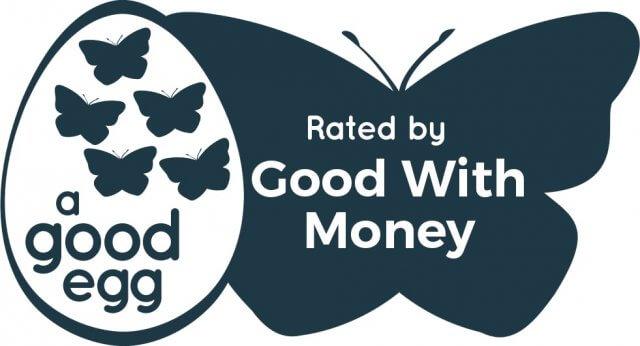
If you want to have a savings account, insurance policy, investment fund or mortgage from companies that do the right thing, check out our Good Eggs.
These are companies that have passed strict (independent) criteria to prove they make a positive impact – to the planet, society, and you.
Good With Money occasionally uses affiliate links to providers or offers, where relevant. This means that if you open an account or buy a service after following the link, Good With Money is paid a small referral fee. We choose our affiliates carefully and in line with the overall mission of the site.



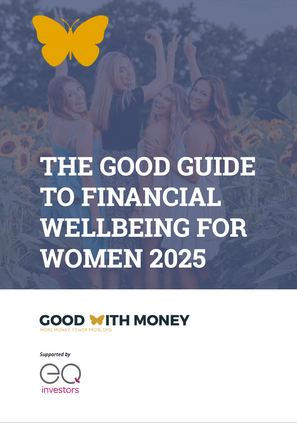

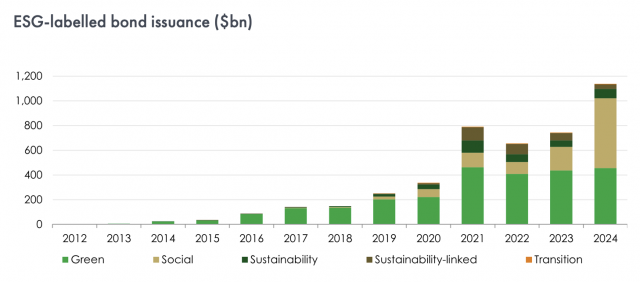





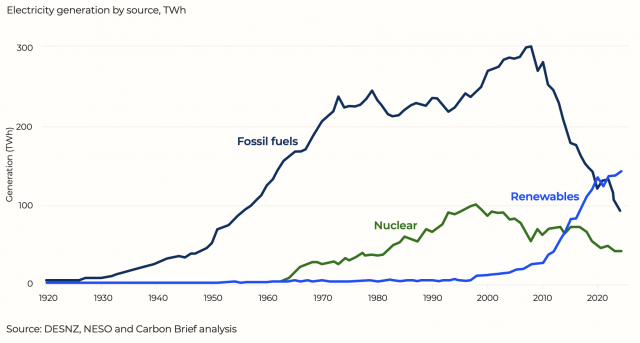
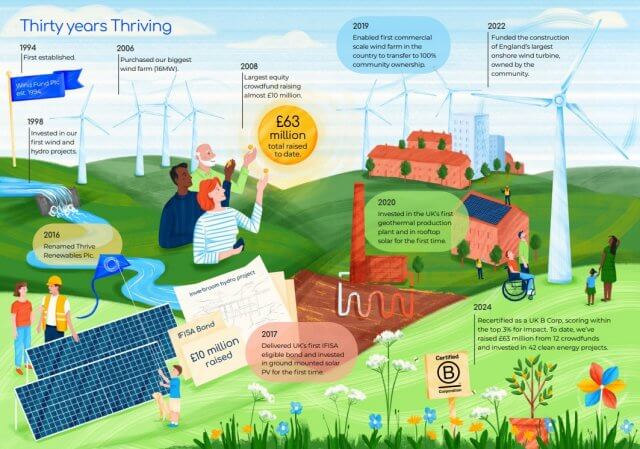
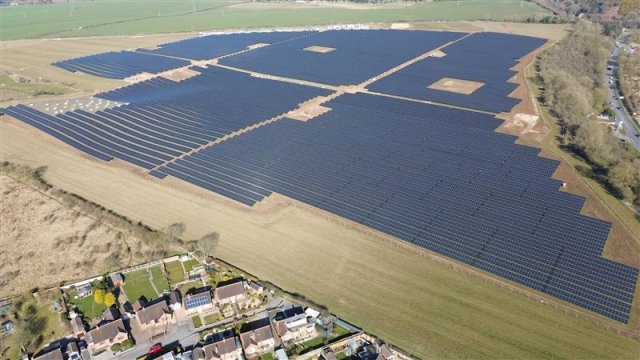
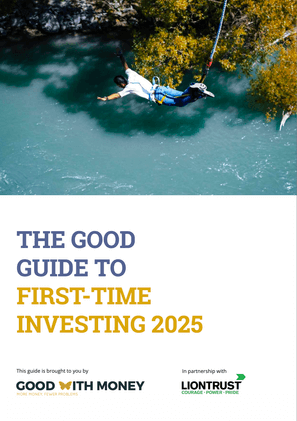 Our new Good Guide to First-Time Investing, is here to help you navigate the many decisions you’ll need to make before taking the plunge into investing.
Our new Good Guide to First-Time Investing, is here to help you navigate the many decisions you’ll need to make before taking the plunge into investing.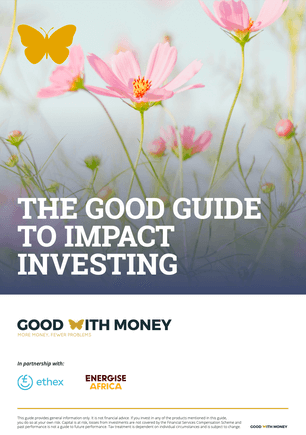
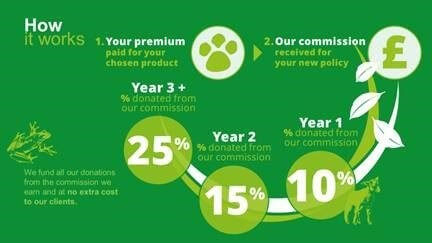

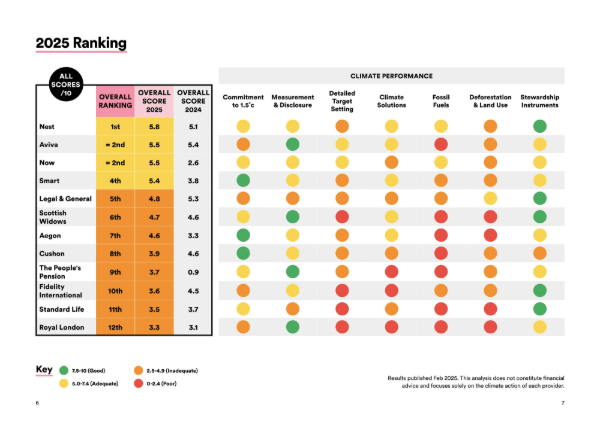





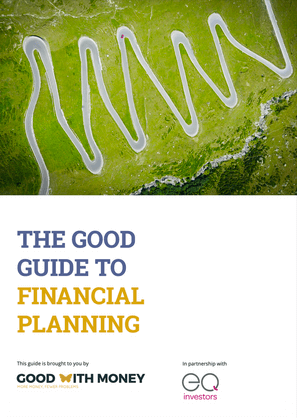 Keeping on top of all this to make ends meet month-to-month is no easy task – let alone making a financial plan for the future.
Keeping on top of all this to make ends meet month-to-month is no easy task – let alone making a financial plan for the future. 
 Ray said: “It was a dream to direct a project like this. A strong idea for an extremely important cause, brought to life with a mesmerisingly powerful talent like Benedict. It’s a strong reminder that we can align our financial decisions with our values, and I’m proud to be part of this important conversation for change.”
Ray said: “It was a dream to direct a project like this. A strong idea for an extremely important cause, brought to life with a mesmerisingly powerful talent like Benedict. It’s a strong reminder that we can align our financial decisions with our values, and I’m proud to be part of this important conversation for change.”






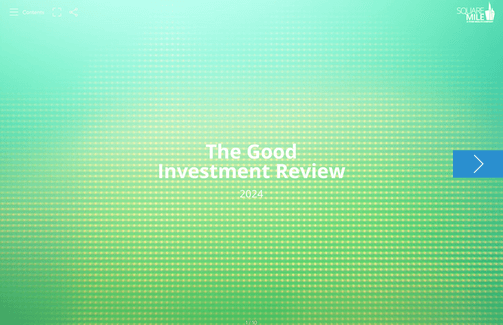
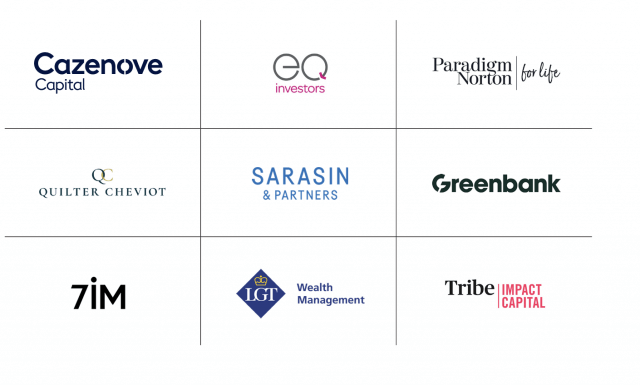
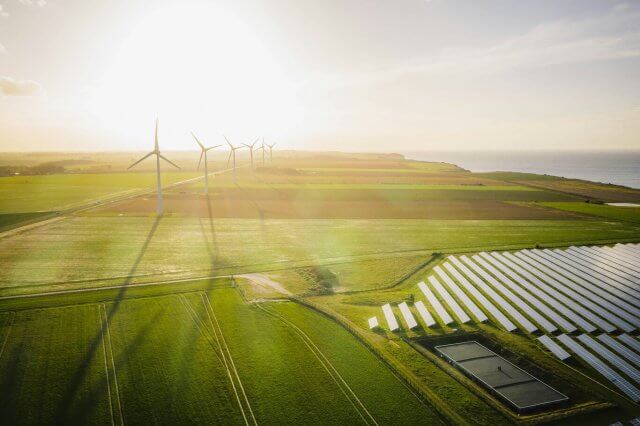


 Steven Day, Independent Financial Adviser at Switchfoot Wealth, said “At Switchfoot Wealth, we’ve developed a new model of financial planning – one that sets sustainability at its core. Our model of “Sustainable Financial Planning” helps individuals and families looking for a long-term financial plan in a changing climate.
Steven Day, Independent Financial Adviser at Switchfoot Wealth, said “At Switchfoot Wealth, we’ve developed a new model of financial planning – one that sets sustainability at its core. Our model of “Sustainable Financial Planning” helps individuals and families looking for a long-term financial plan in a changing climate. Romi Savova, Founder and CEO at PensionBee, said: “2024 has been an incredibly busy and successful year for PensionBee. One of our biggest milestones to date was launching our business in the US, which is the largest Defined Contribution pension market in the world.
Romi Savova, Founder and CEO at PensionBee, said: “2024 has been an incredibly busy and successful year for PensionBee. One of our biggest milestones to date was launching our business in the US, which is the largest Defined Contribution pension market in the world. David Macdonald, Founder of Path Financial, said: “I’m delighted to say that we have continued to see strong inflows into our unique ‘positive impact’ portfolios over the past year and we have also seen a lot of interest in our bespoke, discretionary portfolios which we have devised for clients with larger portfolios who require a more nuanced and granular approach to their specific values and moral standpoint.
David Macdonald, Founder of Path Financial, said: “I’m delighted to say that we have continued to see strong inflows into our unique ‘positive impact’ portfolios over the past year and we have also seen a lot of interest in our bespoke, discretionary portfolios which we have devised for clients with larger portfolios who require a more nuanced and granular approach to their specific values and moral standpoint. Ben Faulkner, Communications Director at EQ Investors, said: “October 2024 marks ’10 years in business’ for EQ Investors (EQ) and we are excited to be celebrating such a great milestone.
Ben Faulkner, Communications Director at EQ Investors, said: “October 2024 marks ’10 years in business’ for EQ Investors (EQ) and we are excited to be celebrating such a great milestone. Matthew Clayton, Managing Director at Thrive Renewables plc, said: “We’ve seen great progress on onshore wind this year with planning consented to extend one of our Scottish wind farms – built on the site of an old open cast coal mine – to potentially triple its generation capacity and development started on a new three turbine project in South Wales.
Matthew Clayton, Managing Director at Thrive Renewables plc, said: “We’ve seen great progress on onshore wind this year with planning consented to extend one of our Scottish wind farms – built on the site of an old open cast coal mine – to potentially triple its generation capacity and development started on a new three turbine project in South Wales. Roger Hattam, director of retail banking at Triodos Bank UK, said: “During the past year, we have continued to focus on financing positive impact, while also ensuring that we meet the needs of our retail customers.
Roger Hattam, director of retail banking at Triodos Bank UK, said: “During the past year, we have continued to focus on financing positive impact, while also ensuring that we meet the needs of our retail customers. Gareth Griffiths, Chief Executive Officer at Ecology Building Society, said: “We were founded in 1981 by people who wanted to build a greener society, challenge the norm, and agitate for positive change in our industry. These principles still govern our decision making and our mission remains the same, but this year we’ve restated our Purpose: in a world that doesn’t add up, daring to be different is our calling, lending our power so everyone’s story gets a chance to thrive.
Gareth Griffiths, Chief Executive Officer at Ecology Building Society, said: “We were founded in 1981 by people who wanted to build a greener society, challenge the norm, and agitate for positive change in our industry. These principles still govern our decision making and our mission remains the same, but this year we’ve restated our Purpose: in a world that doesn’t add up, daring to be different is our calling, lending our power so everyone’s story gets a chance to thrive.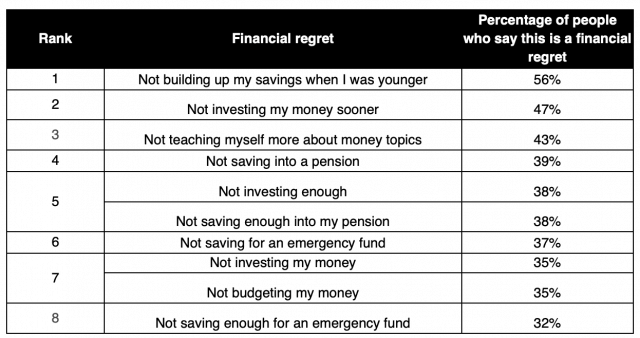

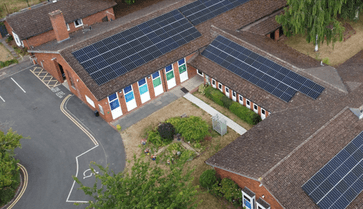
 PensionBee is on a mission to transform the pensions industry by helping people take control of their retirement savings. Launched in 2016, it is now a global leader in the consumer retirement market with over $6 billion (£4.6 billion) in assets on behalf of more than 250,000 customers.
PensionBee is on a mission to transform the pensions industry by helping people take control of their retirement savings. Launched in 2016, it is now a global leader in the consumer retirement market with over $6 billion (£4.6 billion) in assets on behalf of more than 250,000 customers.
